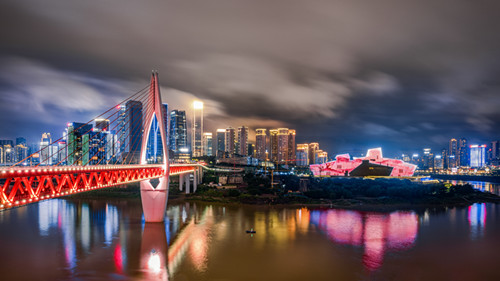Chongqing, the City of Double Celebration
Updated: 2019-08-29
Chongqing, formerly known as Chungking, was China's provisional capital (November 1937 to May 1946) during the Japanese invasion in World War II. It has a unique status in Chinese history in that the Red Communists, Chiang Kai-shek's Nationalists as well as the Americans all had representatives working here during the war. Located at the confluence of two big rivers, the Jialing and the Yangtze, the inland city has a humid climate and is very foggy. This proved vital to its survival during Japan's six-year terror operation (1938-1944) that dropped more than 11,500 bombs, mainly incendiary, on the city, killing over 30,000 people.
The aggression was as diabolical as the locals' fortitude was heroic. They dug into the city's mountains and built thousands upon thousands of air-raid shelters. According to historian Daniel Kurtz-Phelan's book The China Mission, local inhabitants would crowd into shelters when an air raid started, then wash their clothes in bomb craters when it stopped. Chongqing, declared the US Army's Pocket Guide to China, "is the most bombed out city in the world. Yet the people go on." Many of those shelters have been converted into shops and even dance clubs today. Tourists can still visit many WWII historical sites in the city, such as the Stilwell Museum, housed in the former headquarters of General Joseph Stilwell who coordinated the CBI theater of war (China, Burma, and India) from that location.

Scenery of Chongqing [Photo provided to chinadaily.com.cn]

Chongqing, one of China's "three furnaces" located at the confluence of two big rivers, the Jialing and the Yangtze [Photo provided to chinadaily.com.cn]
The city's name, Chongqing, has a story in itself. The two Chinese words, pronounced "chohng cheeng", literally mean "double celebration". Their provenance can be dated to the late 12th century and China's Song Dynasty (960-1279). In the early months of 1189, while Europe lurched toward the Third Crusade as Philip II of France and Henry II of England begin assembling troops, on the other side of the Eurasian continent, a Chinese prince was enjoying the moment of his life. In quick succession he was granted a large fiefdom and was then crowned emperor after his father abdicated. The new king, christened Emperor Guangzong, deemed the occasion so auspicious that he renamed his fiefdom, in today's Chongqing, "Double Celebration" in its honor.
Eight centuries later, that name is still being used. In 1997, Chongqing became China's fourth municipality after Beijing, Shanghai and Tianjin. Covering an area of 82,403 square kilometers, it's by far the largest among the four, even bigger than Ireland or the Czech Republic. As a metropolis with more than 30 million people, Chongqing has a dynamic economy. In 2011 its gross domestic product exceeded 1 trillion yuan (US$158.5 billion) for the first time. In 2017, the local economy grew an impressive 9.3 percent to 1.95 trillion yuan ($283.6 billion dollars). It's now the world's largest laptop manufacturing center and China's largest vehicle production base. The main goal for Chongqing in the next five years will be shifting from high growth to quality growth and making innovation a driving force for development, according to its mayor Tang Liangzhi.
Visitors to this metropolis often find its cuisine a fiery assault on taste buds, yet for the locals no dish is too spicy. The boiling hot pot is without a doubt their favorite. According to the Chongqing Hotpot Association, there are more than 50,000 hotpot eateries in the city, employing at least 3.5 million people. As explained in the Penguin guide book China A to Z, "hot pots are tureens with a fire beneath and filled with a spicy, oily broth. Many courses are served, of everything from noodles to lettuce to meats and fish, which are then dipped into the hot pot to cook and steep in the spices." It's a technically precise description, but the truth is you really have to try it yourself to get all the gustatory fun.
One more thing: Chongqing is also known as one of China's "three furnaces", so named because of its scorching heat in summers. No joke -- a running fixture on Chinese media is the complaints by African students at local universities that their hometowns are so much cooler in the summer. So, be prepared if you are planning a summer trip to the city.


